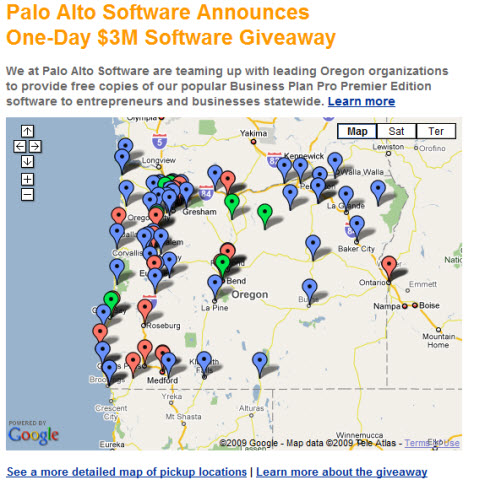I’ve been thinking about this Free business a lot. There’s Chris Anderson’s book Free, and the debate around it. There’s free content everywhere. I find great free photos on Flickr. And I read free blogs every day.
 It’s not like free is all that new. I grew up with free radio and television, funded by advertising. And the free prize in the Cracker Jack package. And free weekends for people naive enough to think they weren’t just an opportunity for sales pitching the condos. Free drinks, free lunches, and free seminars were never really free.
It’s not like free is all that new. I grew up with free radio and television, funded by advertising. And the free prize in the Cracker Jack package. And free weekends for people naive enough to think they weren’t just an opportunity for sales pitching the condos. Free drinks, free lunches, and free seminars were never really free.
I compete against free. Since 1995 I’ve made my living with software that’s for sale, not free. It gets pirated a lot. And it competes with a lot of free stuff.
And I market with free. My company’s business plan resource site Bplans.com is free. My last book, which sells in bookstores and Amazon.com as a book, is also free for reading from start to finish at PlanAsYouGo.com. I’ve done about 2,000 blog posts since 2007, all for free.
Still, today, in this new world, you have to be able to distinguish real free, like a great photo on Flickr, from fake free, like a free seminar that’s a veiled sales pitch.
- Some kinds of self expression, like writing, photography, art, music, and performance, will always compete against free. The greats, I hope, will continue to make money because they’ll stand out enough to generate some economics; but the almost-greats, and the greats-but-undiscovered, will do it for free. I’ve seen great writing and great photography for free on the Web. People do this; they create because they want to create, and they often do it for free. Sure, we all hope to be the commercial successes with our self expressions, but few of us are.
- Some professions are diluted by free contributions. This isn’t new either. I was a professional journalist, full time, as my means of making a living, for almost 10 years. One thing I didn’t like about it was that it was so much fun, and so basically interesting, that there was always somebody new willing to do it for less. That was in the 1970s. Earlier this month I read this Los Angeles Times piece about the difficult plight of freelancers, which is really the same thing as in the 1970s. There’s more of it, but it’s the same thing.
- You’re in a tough spot if you’re competing against something a lot of people will do, and reasonably well, for free. Like writing articles, for example, in my previous point. People will do it for free because they want to. I think that’s why there are so many fabulous musicians playing for tips or nothing at all, actors acting for free in local theaters, and photographers offering freebies on Flickr.
- As a consumer of free stuff, such as free content, you have to look for the business model. One thing I really like about advertising is that it explains free content. One thing I like about Web advertising is it doesn’t (usually) interrupt either. You don’t have to click. Where there isn’t advertising, you have to look behind the curtain for a driver. Sometimes it’s pride, sometimes establishing credibility, sometimes just honest free expression; but there’s also a ton of modern-day equivalent of the cynical seminar as sales pitch. Don’t be naive about it. Free is a legitimate marketing strategy, but don’t confuse free as a marketing strategy with free as free.
So sure, there’s occasionally a free lunch for a good reason. Free samples make for future customers. But don’t take it at face value. Figure out why it’s free.
(Image: Sergey Peterman/Shutterstock)







You must be logged in to post a comment.